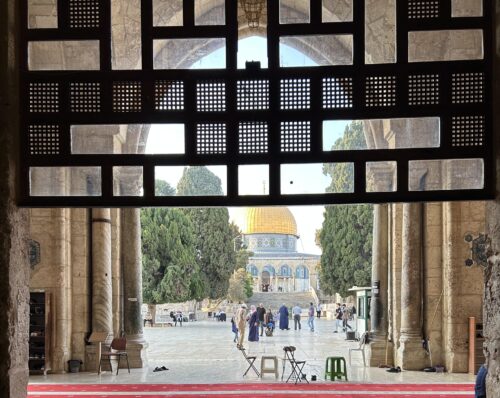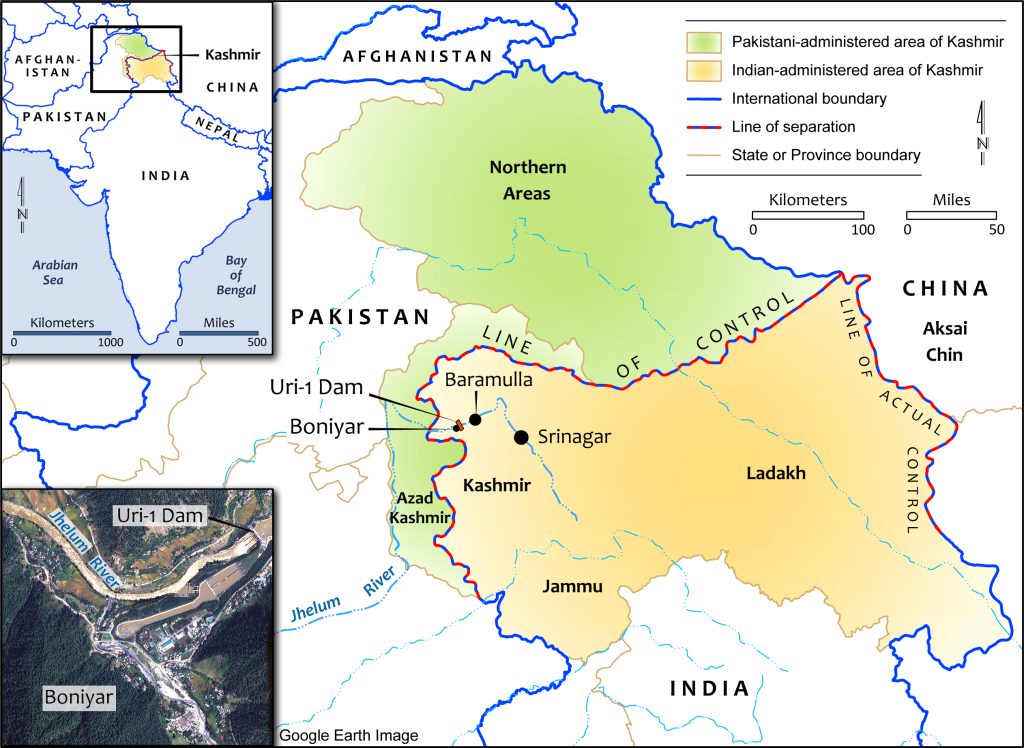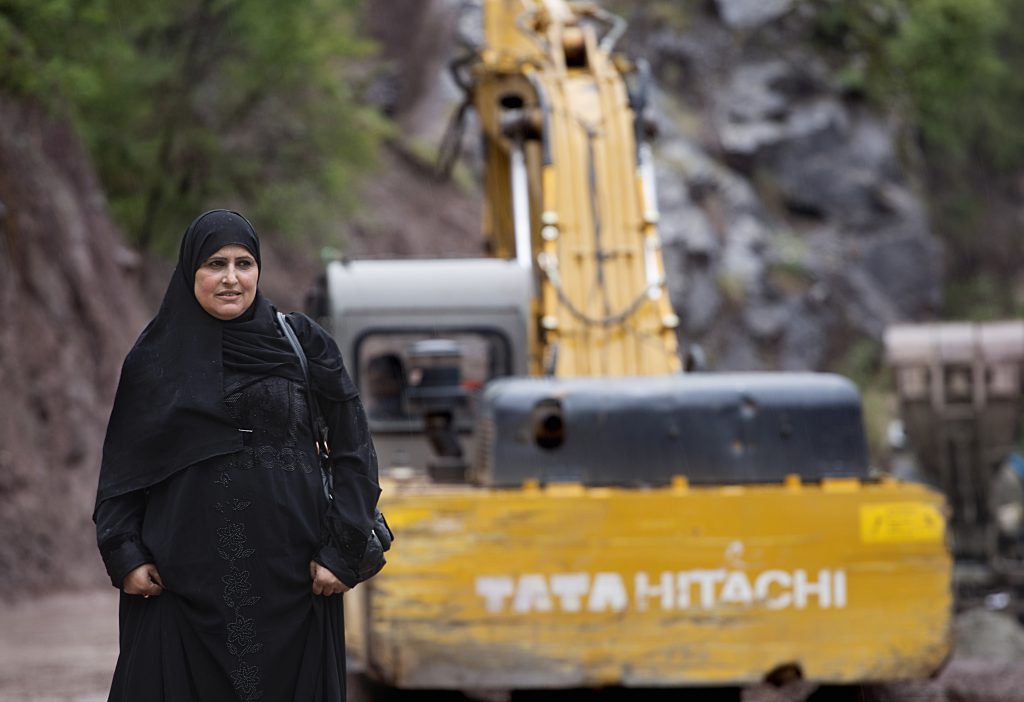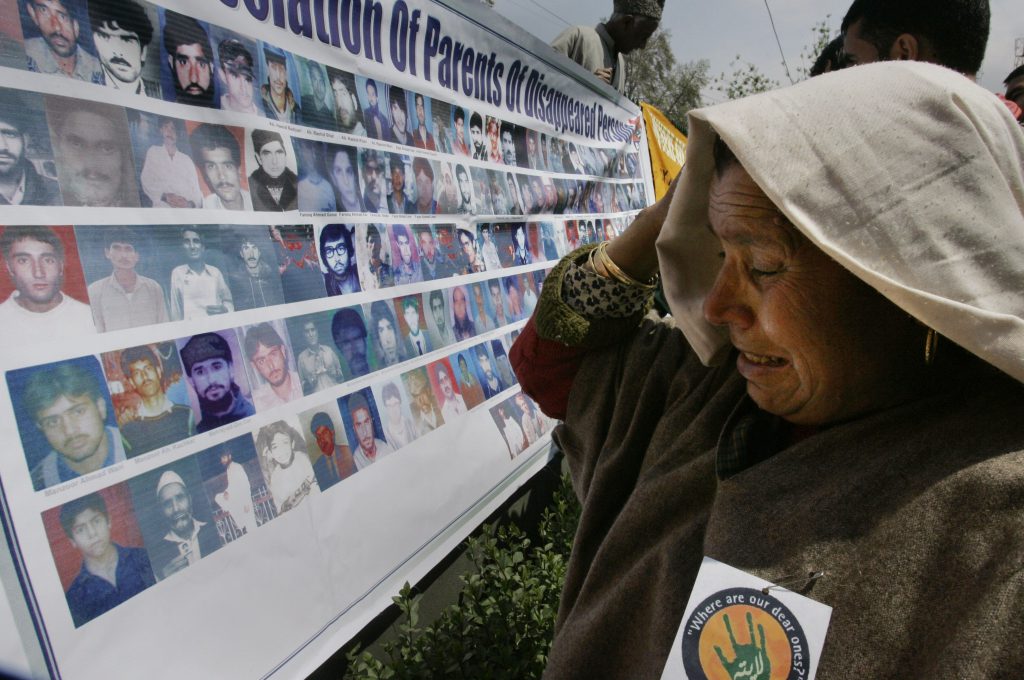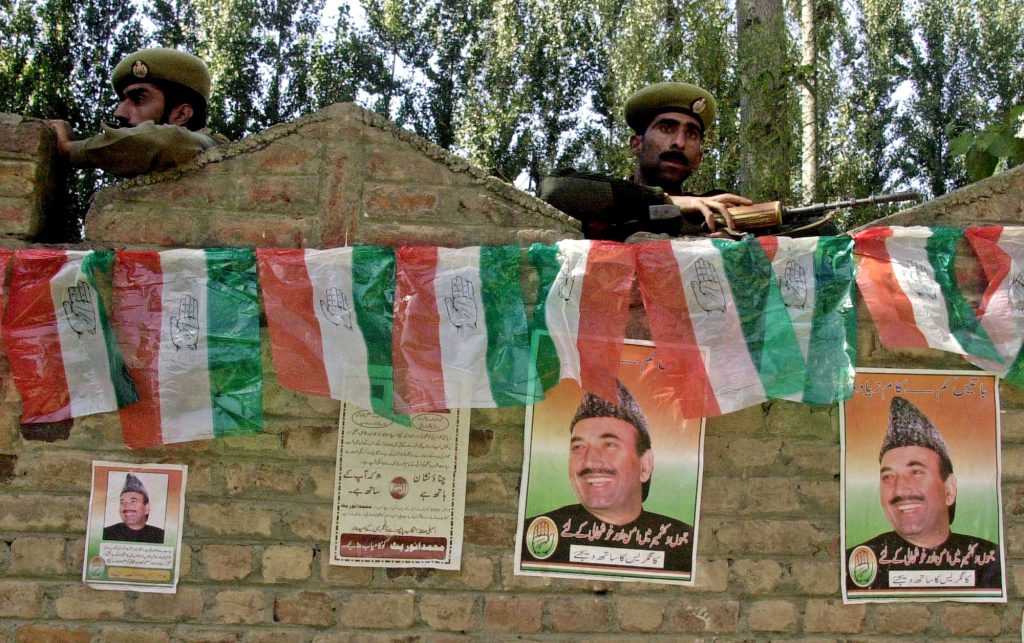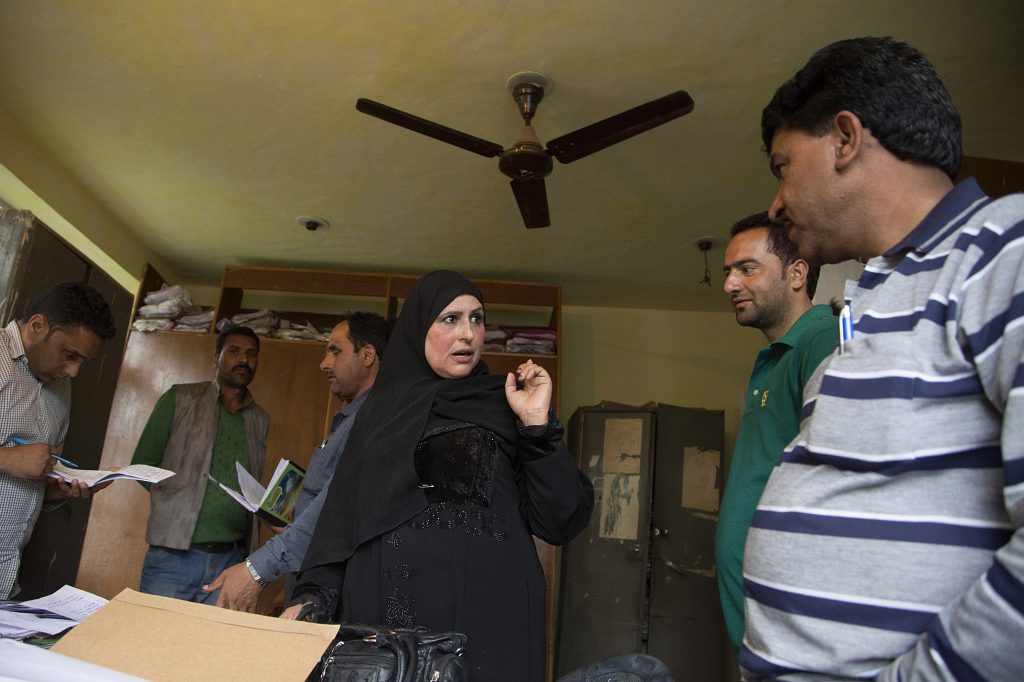Inside Kashmir—A Heroic Fight for Justice

On a hot sunny day in 2015, Razia Sultan picks her way through the debris littering her village of Bela in the administrative block of Boniyar in Indian-occupied Kashmir. Floods had hit the village hard the previous fall. On top of the water damage to structures, the floods had eroded piles of muck and debris on the village’s outskirts, causing massive devastation to land and property. Boulders and pebbles were strewn over large tracts of fertile land. The first floor of Razia’s house was partly filled with sticky mud, and moisture had cracked the walls of her kitchen and living room. She worried that her house could collapse because an earthquake a few years earlier had already wreaked some damage.
The flood was just the latest in a string of disasters and injustices that have marked much of Razia’s life. The debris now strewn around the village, Razia says, was created during the construction of the Uri-1 Dam by the National Hydroelectric Power Corporation (NHPC), India’s premier hydropower company, on the nearby Jhelum River in the 1990s. That dam stands at the epicenter of Razia’s troubles. Her father, Raja Ali Mardan, had refused to sell large tracts of his land to the NHPC for the dam project. Mardan disappeared under mysterious circumstances on May 13, 1990, when Razia was only 15 years old.
Razia’s efforts to find her father started a cascade of events that led to the Indian military’s accusation that she was a terrorist, multiple imprisonments, and torture. After surviving this abuse and violence for 13 years, and fleeing from Bela twice, she returned to live in her village with her mother, daughter, and three siblings in 2003, only to face environmental catastrophe.
Razia’s village is close to the heavily militarized boundary known as the Line of Control that slices Kashmir into two parts, born of the 1947–48 war between India and Pakistan over the disputed territory. The majority of Kashmiris, who are predominantly Muslim, saw India as the aggressor in that war and never reconciled to being ruled by New Delhi. But Kashmir’s struggle for independence had started in 1931 with a popular uprising against the Dogra autocracy that British colonialists had imposed nearly a century earlier when they sold the territory to the Dogras. These Hindu rulers exploited local resources, imposed heavy taxation, and demanded unpaid labor during their 100-year despotic rule over Kashmir.
In 1989, the fight for freedom took a new turn. Four decades after the departure of the British from the subcontinent and the formation of India and Pakistan, Kashmiri civilians, supported by Pakistan, started an armed rebellion against India’s control of the larger part of their territory. They demanded that India honor their U.N.-mandated right to self-determination, which would allow Kashmiris to decide their collective political future. India responded with brute force. Over the last 28 years, the Indian military has killed, tortured, or “disappeared” thousands of Kashmiri civilians and armed rebels—including Razia and her father.
In 2009, journalist Parvaiz Bukhari (a co-author of this essay) met Razia when writing about the discovery of mass unmarked graves across three districts in Kashmir. Razia had helped to initiate that project after stumbling on one such graveyard and seeking the help of the Association of Parents of Disappeared Persons (APDP) to investigate it. In the end, nearly 7,000 unmarked graves of unidentified people were found, many of the graves holding more than one body each, providing one of the most important pieces of evidence for extrajudicial killings and disappearances of Kashmiris by Indian military forces. More than 8,000 people—mostly men—were disappeared between 1990 and 2008, according to human rights organizations. One of the human rights lawyers who worked on that case introduced co-author Mona Bhan, an anthropologist studying the social, political, and environmental effects of the NHPC’s hydroelectric projects in Kashmir, to Razia in 2015.
Together, we have spent years getting to know Razia. She is a striking, charismatic woman with all the qualities of a leader, and none of a victim. Hers is one story among many highlighted in a new book called Behold, I Shine: Narratives of Kashmir’s Women and Children. These stories are a grim illustration of the ways in which Kashmiri families have been torn apart through militarized violence of the Indian state. It is almost impossible to verify the exact details of her story—military and government officials are unlikely to grant interviews about such stories, let alone to incriminate themselves with documents. More significantly, Kashmir has the densest military occupation in the world, with more than a half-million Indian soldiers permanently stationed in its cities, towns, and villages.
In addition to their ubiquitous presence, the military exercises expansive powers over the civilian population in Kashmir because of the Armed Forces Special Powers Act (AFSPA) of 1990, a Parliament of India act that grants the Indian military total impunity against prosecution for civilian abuse, war crimes, and human rights violations. AFSPA disallows any accused military personnel to be tried in a civil court, unless specifically permitted by the central government in New Delhi. Despite hundreds of petitions, including many by the local administration, permission to prosecute has not been granted, even in a single case. Over the years, the implementation of AFSPA has actively eroded a culture of accountability in the military. Therefore, while Razia’s struggles, and other corroborating stories of abuse, torture, and killings, present irrefutable evidence of the Indian military’s human rights record in Kashmir, justice has not been served. Her story has pushed us to seek out the political context that enables this violence.
Razia vividly remembers the day her father disappeared; at 41 years of age when we last interviewed her, she still trembles with anger when recounting the tale. It was late in the evening, and she was at a religious healer’s (pir’s) house in Bela, Boniyar. People from nearby towns and villages were waiting patiently to receive the healer’s amulets for better health or to solicit divine intervention to get their disappeared sons and husbands back from the Indian military. Even the healer’s son had gone missing after he was picked up by the military a few days earlier. Razia recalls the somber mood that night and the sound of people’s wails mixed with prayers.
At around 1 a.m., as Razia waited for an amulet for her ill sister’s well-being, Indian soldiers entered the house accompanied by the healer’s pale and bedraggled son. The people seated in the room were asked to identify themselves. Razia introduced herself as the daughter of Raja Ali Mardan, a respected landlord and worker at a local cooperative. The soldier seemed to recognize the name—perhaps because her father had resisted the NHPC’s land grabs in the area. A few who had dared to oppose the NHPC had been beaten up, disappeared, or even killed. “He will not return tonight,” the soldier told her in a cold voice. Razia leapt toward the door to escape, but the soldier warned her that if she stepped outside the house she would be killed.
The next morning, when Razia finally arrived home, she found that her father was missing—and he never returned. Razia refused to passively wait for his return or to prematurely mourn his death. She accompanied her mother to all the jails in the Indian-administered region as well as some in India. She fearlessly walked into police stations and government offices looking for clues. She struggled on alone when her mother and siblings gave up on trying to find him after searching for him in prisons throughout Pakistani-controlled Kashmir. All the while, Razia continued to block the NHPC’s attempts to forcibly acquire her father’s land.
In her characteristically defiant tone, Razia explained to us in 2015 that she “told the NHPC officials and the military that we would gladly accept the compensation only after we locate our disappeared father, who’s the owner of this land.” Soon after this encounter, a local state official issued Mardan’s death certificate, but Razia stood her ground, asking for her father’s dead body. She recalls this incident as a turning point in her life; challenged by her defiance and boldness, state officials and the military decided to, as Razia says, “come after me in a big way.”
From 1990 to 1995, the military raided Razia’s home several times, harassing her and her family. “The soldiers would frequently come to my house under the pretext of searching for ammunition,” she recalls. One morning in 1995, she woke up to find that government-issued posters had been slapped up throughout Boniyar, promising informers money for locating “Baby” (a term of endearment that Razia’s family and neighbors used for her) or disclosing her whereabouts. Razia recalls being shocked by the posters since she had recently visited the nearest police station, identifying herself as Baby, to lodge a complaint against Indian soldiers who were harassing her. Realizing that the local police were not on her side either, she fled Bela to live with a female friend in Srinagar, the summer capital of Kashmir, which is about 60 miles from her village.
A specially trained and dreaded counterinsurgency division of the police, called the Special Task Force (STF), caught up with Razia a few months later when she returned to Baramulla, the district where her village is located, to attend a friend’s wedding. A posse of STF soldiers “came looking for me in the middle of the night,” Razia recalls. They failed to identify her and eventually left. She and her cousin fled the village at dawn, but they were soon intercepted by soldiers; hundreds had apparently been authorized to arrest 20-year-old Razia.
Razia and her cousin took refuge inside a nearby shrine, she says, but the military started firing. All Razia could see were sparks from the volley of bullets directed at them. She has blurry memories about the train of events that followed after the soldiers entered the shrine and beat her with rifle butts; she tells of how her burqa was soaked in blood that was dripping from her fractured skull and that she was unable to walk. They charged her for carrying a Pakistani-sponsored gun, which they never found, for holding illegal money, and for abetting anti-state activities by supporting Kashmiri rebels. She was detained under the draconian Terrorist and Disruptive Activities (Prevention) Act, a now-repealed law under which an accused could be convicted or acquitted but not granted bail, and the Public Safety Act (PSA), which allows administrative detention without trial or juridical oversight for up to two years under the pretext of maintaining public order. Out of hundreds who were imprisoned under PSA between 1995 and 2008, only 16 were women.
Razia did have 100,000 rupees (equivalent to about US$1,600 today) with her, she says—but it wasn’t illegal. The money was from the NHPC for a house her father had gifted her, which the company had demolished without her consent before providing her with partial compensation for it. Using this money, she planned to open a clothing business with a friend. Razia denies that she ever possessed a gun. And there is little reason for us to believe that she was ever an armed militant. In Kashmir, there have been cases in which local women were recruited as spies by both government forces and armed rebels. Women also sometimes carried weapons and ammunition for the fighters. But there have been no reported instances of armed female fighters in Kashmir; most women have defiantly resisted Kashmir’s occupation through other means. In response to the many who had been disappeared by the military, for example, Kashmiri women mobilized in 1994 to form the APDP under the leadership of Parveena Ahangar, popularly known as the “Iron Lady of Kashmir,” whose son was disappeared by the military.
After her first arrest, Razia remained in custody for over two and half years, during which time she was brutally tortured. Some of her veins were sliced open, she says, and her hair was pulled out. “When I think of those days in prison, my head feels like a boiling pot of water,” she says, recalling her ordeal. Her interrogators would consistently ask her to tell them about weapons and ammunition, which she was unable to do. She recounts being housed in a small cell, where rats nibbled on her flesh and nails. Unable to sleep in the cramped space, she stayed up most nights, wondering why she was in jail as one of Kashmir’s dreaded and sought-after “terrorists.” She worried for her 4-year-old daughter, who she’d left behind with her mother and younger sister.
Over the two years we interviewed her, Razia would often slip into intervals of silence, looking lost or fumbling for words to describe her pain. But she would compose herself quickly, at times fighting back tears. “I put up this brave face,” she would say. “Life has to be lived with dignity.”
By the time Razia was released from jail in 1998, her first husband had left her. She had married in 1992 at the age of 17, which is not unusual for her village, but her husband had not been supportive of her quest to find her father. When she returned from jail, she found a way to economic independence through a poultry farm that she opened in her backyard in Bela. But Razia remained on the police radar. Within a year, nighttime raids started once again.
She remembers soldiers taunting her: “Why don’t you get married? Is it because you have vowed to carry the weight of Kashmiri militancy on your head?” Many saw marriage as a way to rein her in, restrict her independence, and contain her rebellion, Razia believes. At one point in 1998, a Hindu army major offered 1,000 rupees and instructed Razia’s mother to buy beef so he could marry Razia and “rescue her from her doomed fate as a wanted terrorist.” Razia once again fled her home, seeking refuge with a friend in Srinagar. The enraged army major attempted to fabricate a case of treason against her, Razia says, implicating her in the murder of a local superintendent of police. But before the army major could press formal charges against her, she says, his tenure in Kashmir ended, and he was transferred.
Razia tried to live a quiet and anonymous life in Srinagar, but she found that she couldn’t ignore injustice. Frequently, she would question soldiers for arbitrarily stopping and frisking young boys on the streets. “I was not scared of anyone. I always sided with the truth,” she says. But living away from home was emotionally and physically exhausting for her; she decided to return to Bela in 2002, right before state elections were held in Kashmir.
Over the years, several scholars and journalists have noted that the election process in Kashmir, which some have derided as “demon-crazy,” relies on coercing people into supporting one pro-India party or another in order to reinforce India’s proxy rule. To drum up support for pro-India politicians, the Indian state devised a counterinsurgency strategy in the 1990s, a fact known to Razia and many other Kashmiris who were caught up in this exercise. It cultivated a network of local informants who became enmeshed with military camps across Kashmir in order to sniff out support for armed rebels. These informants identified prominent rebel supporters and their families for military camp commanders who would raid and arrest one or more members of the family. After many months of abuse and torture, these detainees were often “rescued” by pro-Indian politicians. The victims would remain beholden to the politician for saving them from possible death—or worse, disappearance. The politicians then used their favors to coerce people to vote for them in elections.
Razia tried to counter this practice in Boniyar by offering her support to a known politician from the Indian National Congress, one of India’s most prominent parties. Even though this politician was no different from most of the others, and Razia had no faith in India’s political system, she wanted to influence the system from within. Also, her father had been a member of the Congress party, and she wanted to use his connections to track him down.
During the course of the campaign, when she was back home, military officials tried to recruit her as an informant, Razia says. She refused. Razia’s candidate won the election, but the Congress party failed to earn a majority in the state. As a result, the process of forming the government was delayed. In the interim period, when Kashmir had no active government, Razia was again arrested—this time on the accusation that she had used guns to intimidate people to vote for the Congress party candidate. Razia attributes her arrest to her antagonism against the former ruling party and her refusal to be a military spy. This time she was detained in Cargo, one of Kashmir’s open-secret torture houses.
Razia recalls her six months in Cargo with horror. She was beaten mercilessly for days on end and repeatedly kicked in the head and around her kidneys, she says. The worst part about Cargo for Razia were the unending and gut-wrenching shrieks and cries from an adjacent cell where the police would routinely torture young men. “My cell had a glass window, so I could look outside. I would see boys and young men, who were arbitrarily picked from their houses or streets, dressed in freshly washed T-shirts and jeans, dragged into a cell. And half an hour later, lifeless and limp bodies covered in black blankets would be dragged out of the cell, piled on top of each other. Pieces of their flesh remained stuck to the walls. The stink of death lingered in the cells and corridors long after they were tortured to death.” Aware that Razia was haunted by the helpless cries of young Kashmiri men, the police would routinely interrogate her in an area close to where the men were tortured. When she would lift her hands to cover her ears, the interrogators would hit her elbows with sticks and batons.
Razia somehow managed to enlist the help of one of the police officers. She was eventually released, a rare fate for most Cargo detainees. She says she attributes her release to a series of fortunate events, starting from her chance encounter with the sympathetic police officer, who informed her family about her arrest. Her mother and sister then sought help from a few Congress party politicians Razia had aided during the election campaign. But in recounting her time in Cargo, she says that “ultimately” it was “God’s will” that prevailed. Razia says she did not have a strand of hair left on her head and was almost bedridden for two years after her release, during which time her mother and sister took care of her.
But according to Razia, her biggest ordeal was yet to come. In 2006, a sex scandal made front-page news in Kashmir. Several high-level politicians, bureaucrats, police, and security officials were accused of coercing underage girls into sex and prostitution. The “racket” was alleged to have been orchestrated by a woman named Sabeena, who was accused of drugging girls and filming pornographic videos of them that were later used to blackmail the girls into prostitution. Razia’s image was flashed across many Urdu newspapers, with headlines such as “Uri’s Baby Becomes Sabeena in Srinagar.” (Uri is the other close administrative division, but most Kashmiris talk of Boniyar and other adjoining areas as Uri.) Razia believes she was scapegoated by politicians who did not want the real Sabeena to get caught in case she implicated them in sex crimes. Razia claims this incident was the hardest to deal with. “I would rather die than see myself implicated in a sex scandal,” she said. A proud, morally upright woman, she felt that the state had conspired to ruin her reputation and “hit her where it hurt the most.” Luckily for Razia, the real Sabeena was soon arrested (though she was later acquitted).
Twenty-six years after her father’s disappearance, as Razia recounts the long litany of accusations against her—from terrorism to prostitution—that could have crushed her body and soul, she stands firm, drawing strength from her lifelong commitment to truth and justice.
Razia now runs a weaving center for young women out of her two-story house in Bela. The floodwaters have not spared the walls of her second-floor room either—a number of them have cracks. But despite the damage, a group of young women work on their weaving skills while intermittently breaking into chatter. In the aftermath of the flood, without much help from the government, Razia hired a bulldozer to clear the nearby agricultural fields of mud and rubble. This work inspired her to also become a contractor, an unusual line of work for women in Kashmir.
Razia continues to visit state offices to fearlessly navigate the bureaucracy in her fight for delayed or abandoned public works projects. In her village, she commands the moral authority of a community advocate as she assembles and mobilizes people to fight for their rights, knowing full well the constraints of doing so under a military occupation. And sometimes women come to her for help; she laughs hard when remembering how she once pretended to be a teacher starting up a new school in order to force a couple of soldiers out of a woman’s home that they had occupied. She understands that nothing much has improved in Kashmir over the years. Her story is even more illuminating within the context of an ongoing series of student-led rebellions against Indian rule. With stones in their hands, young men and women have reclaimed the streets, dodging the tear-gas shells and pellet guns of the military, which continues, with impunity, to kill a new generation of Kashmiris across different parts of the occupied territory.
Razia tells us that she feels broken physically, and exhausted. But her spirit refuses to die. She says her tireless social work for the community is a tribute to her father, whose return she still awaits.



























